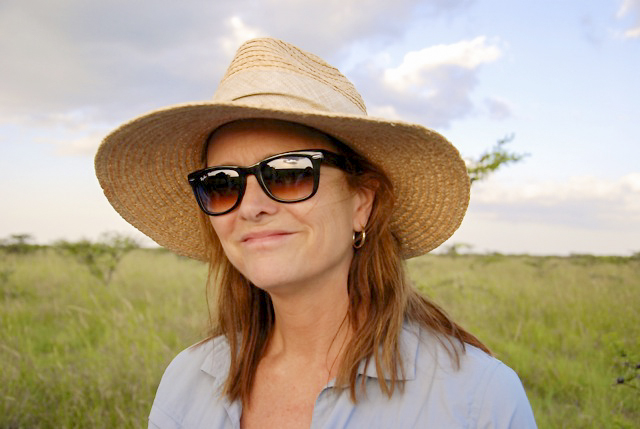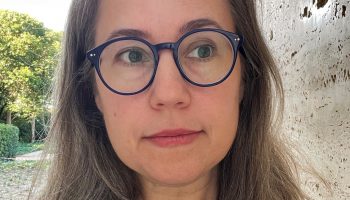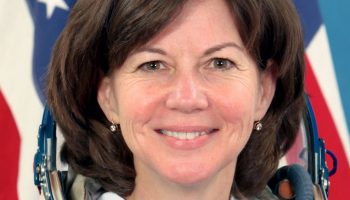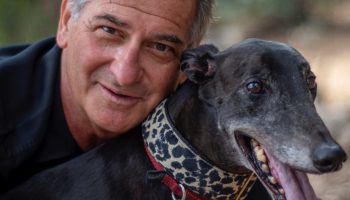DEBORAH TREFTS – STAFF WRITER

Writing and producing impactful documentary films in a seriously competitive television market is no easy feat. Keen perspective is needed to grab and hold on to the attention of viewers who can switch channels or log off streaming programs within minutes, if not seconds, of tuning in to them.
As multiple award-winning documentary environmental filmmaker and resilience communicator Katie Carpenter knows well, experience is an asset, and curiosity and knowledge are essential.
“I’ve made 50 films and half of them have been about the environment,” Carpenter said. “From wildlife to poaching to climate change, climate change, climate change. Then I met (Chautauquan) George Fechter, and he runs Resilient Enterprise Solutions.”
She said she “switched gigs in the middle of COVID” to write articles and produce videos about the risks of rising waters — also known as sea level rise — for audiences in vulnerable coastal communities. Currently she is the essayist and communications vice president for RES, which provides home elevation and flood proofing on Florida’s Atlantic and Gulf coasts.
At 1 p.m. July 29 on the CHQ Assembly Video Platform, Carpenter will deliver the Chautauqua Women’s Club’s third and final Contemporary Issues Forum lecture of the 2021 season: “Walking with Elephants: Adventures with Wildlife to Climate Change and Resilience.”
“My career path was twisting,” she said. “It was not a very straight line. That’s typical for documentary film careers.”
After majoring in comparative literature at Princeton University, Carpenter worked for Washingtonian magazine, where she said she was “pulled into the political campaign for George H. W. Bush, and joined (it) on the road in Pennsylvania and New York as a surrogate speechwriter.”
When she returned to Washington, she landed a job as the coordinating producer of “Inside Story,” a weekly PBS show hosted by Hodding Carter III that examined the media and public affairs.
From there, Carpenter moved to ABC. At ABC News, she served as editor of the three-hour “Close-Up,” “To Save Our Schools, To Save Our Children” (a 1984 Peabody Award winner), and as producer and writer of the weekly prime time network series “Our World,” about the history of U.S. popular culture (an Emmy nominee).
For ABC Video and Weintraub Entertainment for Arts & Entertainment (A&E) Network, she was senior producer for a 52-part series on the Cold War, “The Eagle and the Bear.”
“I think the most important turning point of my film career was ‘Race to Save the Planet,’ ” Carpenter said.
“Race” is a 10-part series on environmental impacts of the modern world that was produced for public television in Boston, Australia and India.
“They had to have 10 people without environmental film experience producing it,” she said “Environmental reporters hadn’t had success communicating these issues.”
Each of the series’ 10 production teams included a producer, associate producer and editor. Carpenter said that for three weeks, these 30 people spent all day, every day, in “Eco-School” at Harvard University. Writers, cinematographers, directors and other staff were shared among the teams.
“They put us on assignment,” she continued. “I went to Brazil and spent long enough there to know that we needed to have an impact. They needed me to ‘storm the ramparts.’ ”
During her first trip to Brazil for “Race to Save the Planet,” Carpenter spent three months covering the Chico Mendes story. Mendes was a Brazilian rubber tapper, literacy teacher, trade union leader and environmentalist who sought to save rubber trees, the Amazon Rainforest and, ultimately, humanity.
“The rubber tappers were in the rainforest protecting it,” Carpenter said. “I was embedded with them, living in Chico’s backyard. When we finished, we went to São Paulo. We were there when he was assassinated, so we went running back. We were helping prolong his impact beyond his death.”
Over a period of two years, 10 different films were shot for “Race.” Carpenter served as a producer, director and writer and had the principal responsibility for “In the Name of Progress,” which was filmed in India and Brazil and hosted by Meryl Streep.
“These were not just music films,” Carpenter said. “There was a purpose to it all. All of us stayed on in environmental filmmaking afterwards. … Filmmakers can extend or enlarge or amplify the impact of environmental voices in a way that they themselves cannot.”
Thus each year, the WGBH-TV, host of “Race to Save the Planet,” holds an “Idea Lab” and invites people like Carpenter back for a roundtable charrette on how to save the planet.
At National Audubon Society Productions, Carpenter served for three years as vice president and executive producer. In these capacities she supervised the production of broadcasts and educational videos on environmental and wildlife topics. In addition, she supervised electronic field trips and weekly wildlife series for Animal Planet, Disney Channel and PBS.
She has also served on the Women in Conservation Council at the National Audubon Society.
Film work focused on the needs of wild places and creatures, and on growing concerns about climate change, has taken Carpenter throughout Africa, Asia and Latin America. Her work includes three National Geographic film specials shot on location in Kenya, Tanzania and China: “Battle for the Elephants,” “Warlords of Ivory,” and “Bones Of Turkana.”
Also, for MSNBC, Carpenter made “Future Earth: 100 Heartbeats,” a two-hour feature documentary about critically endangered species that was filmed in Cambodia and Indonesia. And for Discovery, Carpenter made the Emmy-nominated documentary “A Year on Earth,” which tracks global environmental issues through the perspectives of high school students traveling to Africa and Latin America to work in the field with environmental scientists.
Carpenter said that when she took a group of students around the world, one of them told her that she was going to write a book about the animals we love to hate, that people fear and despise for cultural reasons.
“Covering endangered species taught me a lot about the climate and the planet,” Carpenter said. “It also taught me what it was about these species that make people want to kill them.”
At Princeton, she has taught documentary filmmaking as an adjunct professor, including a one-semester Global Seminar on Wildlife Filmmaking at the university’s Mpala, Kenya, campus.
The author of a book on dolphins, Carpenter said she pivoted toward the oceans for her last three film projects.
First, she served as a producer on the six-hour series “Ocean Warriors” for executive producers Robert Redford and Paul Allen. It explores issues in ocean conservation and profiles global crusaders in the battles against illegal fishing and slavery at sea.
“Ocean Warriors” won the Best Documentary Series Award at the Jackson Hole Wildlife Film Festival (now Jackson Wild) and the Genesis Award for Best Television Series.
Next, Carpenter produced, wrote and directed the science documentary, “Toxic Tide,” for the Ocean Foundation and Brick City TV. This film covers the rise of blue-green algae (cyanobacteria), its poorly understood molecules, and its aggressive takeover of inland waters in the United States.
Her third ocean documentary is the multi-award-winning, feature-length film, “Chasing the Thunder” — an eco-thriller on the high seas that illuminates the dangerous crusade to curtail illegal fishing around the world. It follows the Sea Shepherd’s 110-day, 10,000-mile chase of the world’s most notorious poaching vessel, Thunder.
For Yale Law School, Carpenter analyzed climate media and polarization for five years as a project director and media consultant for the Evidence-Based Science Communication Initiative of the Yale Cultural Cognition Project.
As project director and media consultant, she worked with a team of experts in communications, psychology and policy-relevant science to evaluate documentary films and other media coverage of polarizing issues – climate change, nuclear power, gun control and vaccines – that are policy-relevant and science-based.
Carpenter produced “videos for qualitative testing to help scientists understand how climate science information land(ed) inconsistently across diverse cultural audiences,” and she recommended strategies to avoid the polarization that is so problematic for policymaking in this arena.
“After (the ‘Race to Save the Planet’) turning point in my career, the next turning point was that I could take my environmental knowledge and filmmaking to make an impact,” Carpenter said.
At RES, she is “not just filling air time.” She said that during the second half of her career, her audience is smaller and there are longer-lasting implications.
“As George Fechter always says, ‘The water is coming; we’ve got to get on it right now; we can’t leave it on the back burner,’ ” Carpenter said. “What (he) is doing is amplifying environmental voices” in a way that others cannot.
So, too, is Carpenter. She credits her father for pushing his six children to be active and involved, and to travel.
“We literally had his favorite quote — which we all like — memorized by age 6,” said the comparative literature major.
Her father said, “You have one job: ‘To follow knowledge like a sinking star, beyond the utmost bound of human thought. ’ ” – Alfred Tennyson’s Ulysses.




